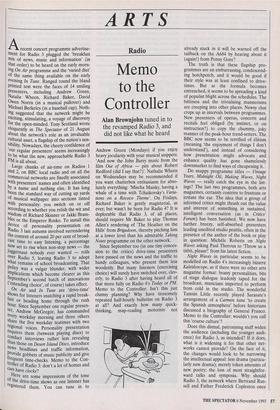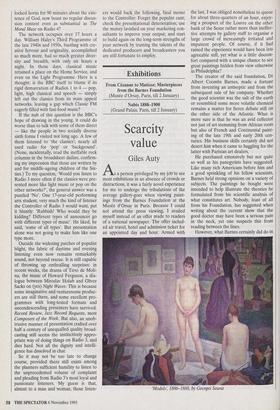ARTS
Radio
Memo to the Controller
Alan Brownjohn tuned in to the revamped Radio 3, and did not like what he heard
Arecent concert programme advertise- ment for Radio 3 plugged the 'breakfast Mix of news, music and information' (in that order) to be heard on the early morn- ing On Air programme and the 'varied diet' of the same thing available on the early evening In Tune. Ranged round the bland Printed text were the faces of 14 smiling Presenters, including Andrew Green, Natalie Wheen, Richard Baker, David Owen Norris (in a musical pullover) and Michael Berkeley (in a baseball cap). Noth- ing suggested that the network might be exciting, stimulating, a voyage of discovery for the open-minded. Tony Scotland wrote eloquently in The Spectator of 21 August about the network's role as an invaluable cultural asset, a flagship of the nation's sen- sibility. Nowadays, the cheery confidence of our regular presenters' seems increasingly to be what the new, approachable Radio 3 FM is all about.
Large chunks of air-time on Radios 1 and 2, on BBC local radio and on all the Commercial networks are fixedly associated With presenters' names and often identified by a name and nothing else. It has long been the standard way of cutting up yards of musical wallpaper into sections tinted With personality: you switch on or off according to whether you relish the wit and wisdom of Richard Skinner or Jalcki Bram- bles or the Emperor Rosko. To install this device of personality presentation on Radio 3 last autumn involved surrendering the content of around 20 per cent of broad- cast time to easy listening, a percentage fl OW set to rise when non-stop news — the Juggernaut nobody ever wanted — rolls over Radio 5, leaving Radio 3 to adopt what remains of school broadcasting. That Policy was a vulgar blunder, with wider linPlications which become clearer as this September's second batch of innovations ( extending choice', of course) takes effect. °n Air and In Tune are 'drive-time' Shows for listeners snatching a rapid break- fast or heading home through the rush hour. Since September one regular presen- ter, Andrew McGregor, has commanded every weekday morning and three others Share the five weekday teatimes with two regional voices. Personality presentation requires them (between playing discs) . to conduct interviews rather less revealing than those on Desert Island Mks, introduce news headlines and traffic information, provide gobbets of music publicity and give frequent time-checks. Memo to the Con- troller of Radio 3: don't a lot of homes and cars have clocks? Here are some impressions of the tone of the drive-time shows as one listener has registered them. You can tune in to Andrew Green (Mondays) if you enjoy heavy jocularity with your musical snippets: 'And now the John Barry music from the film Out of Africa — pity about Robert Redford (did I say that?)'. Nathalie Wheen on Wednesdays may be recommended if you want chatterbox enthusiasm for abso- lutely everything: 'Mischa Maisky, having a whale of a time with Tchaikovsky's Varia- tions on a Rococo Theme'. On Fridays, Richard Baker is gently magisterial, as ever; but wasn't he born for Radio 4? It is deplorable that Radio 3, of all places, should require Mr Baker to play Thomas Allen's rendering of 'The Heather on the Hills' from Brigadoon, thereby pitching him at a lower level than his admirable Taking Notes programme on the other network.
Since September too (in one tiny conces- sion to the critics) drive-time presenters have passed on the news and the traffic to handy colleagues, who present them less woodenly. But many listeners (exercising choice) will surely have switched over, clev- erly, to Radio 3 after having heard all of that more fully on Radio 4's Today or PM. Memo to the Controller: Isn't this just clumsy planning? Why have tiresomely repeated half-hourly bulletins on Radio 3 at all? And exactly how many quick- thinking, map-reading motorists not already stuck in it will be warned off the tailback on the A684 by hearing about it (again!) from Penny Gore?
The truth is that these flagship pro- grammes are an embarrassing, condescend- ing hotchpotch, and it would be good if their style was at least confined to drive- times. But as the formula becomes entrenched, it seems to be spreading a kind of populist blight across the schedules. The bittiness and the trivialising mannerisms are creeping into other places. Newsy chat crops up in intervals between programmes. New presenters of operas, concerts and recitals feel obliged (by instinct, or on instruction?) to copy the chummy, joky manner of the peak-hour trend-setters. The BBC now seems to be terrified of elitism (meaning 'the enjoyment of things I don't understand'), and instead of considering how presentation might advocate and enhance quality has gone shamelessly downmarket to find ways of cheapening it.
Do snappy programme titles — Vintage Years, Midnight Oil, Making Waves, Night Waves — really catch the eye in the list- ings? The last two programmes, both arts magazines, certainly contrive to frustrate or irritate the ear. The idea that a group of informed critics might thrash out the value and interest of something in sustained, intelligent conversation (as in Critics' Forum) has been banished. We now have further breezy, self-absorbed presenters leading unedited studio prattle, often in the presence of the author of the book or play in question: Michele Roberts on Night Waves asking Paul Theroux to 'Throw us a titbit, please!' from his latest fiction.
Night Waves in particular seems to be modelled on Radio 4's increasingly bizarre Kaleidoscope, as if there were no other arts magazine format: brassy personalities, bits of stage dialogue leadenly taped for the broadcast, musicians imported to perform from cold in the studio. The wonderful Tamsin Little recently played Sarasate's arrangement of a Carmen tune 'to create the Spanish atmosphere' before historians discussed a biography of General Franco. Memo to the Controller: wouldn't you call this 'coarse culture'?
Does this dismal, patronising stuff widen the audience (including the younger audi- ence) for Radio 3, as intended? If it does, what is it widening it for that other net- works cannot provide? On the face of it, the changes would look to be narrowing the intellectual appeal: less drama (particu- larly new drama); merely token amounts of new poetry; the loss of most straightfor- ward talks and symposia. Why shOuld Radio 3, the network where Bertrand Rus- sell and Father Frederick Copleston once locked horns for 90 minutes about the exis- tence of God, now boast no regular discus- sion content even as substantial as The Moral Maze on Radio 4?
The network occupies over 17 hours a day. William Haley's Third Programme of the late 1940s and 1950s, bustling with cre- ative fervour and originality, accomplished so much more, had so much greater diver- sity and breadth, with only six hours a night. In those days, classical music retained a place on the Home Service, and even on the Light Programme. Here is a thought: is the BBC itself to blame if its rigid demarcation of Radios 1 to 4 — pop, light, high classical and speech — simply left out the classics from its mass appeal networks, leaving a gap which Classic FM eagerly filled with fast-food music?
If the nub of this question is the BBC's hope of drawing in the young, it could do worse than to talk with some of them direct — like the people in two socially diverse sixth forms I visited not long ago. A few of them listened to 'the classics'; nearly all used radio for 'pop' or 'background'. (None, incidentally, read the ineffable rock columns in the broadsheet dailies, confirm- ing my impression that those are written by and for middle-ageing children of the Six- ties.) To my question, 'Would you listen to Radio 3 more often if the classics were pre- sented more like light music or pop on the other networks?', the general answer was a puzzled 'No'. One 17-year-old performing arts student, very much the kind of listener the Controller of Radio 3 would want, put it bluntly: 'Rubbish! Who would they be kidding? Different types of announcer go with different types of music'. He liked, he said, 'some of all types'. But presentation alone was not going to make him like one type more.
Outside the widening patches of populist blight, the fabric of daytime and evening listening even now remains remarkably sound, not beyond rescue. It is still capable of throwing up enthralling surprises: in recent weeks, the drama of Tirso de Moli- na, the music of Howard Ferguson, a dia- logue between Miroslav Holub and Oliver Sacks on (yes) Night Waves. This is because some imaginative and venturesome produc- ers are still there, and some excellent pro- grammes with long-tested formats and uncondescending presenters have survived: Record Review, Jazz Record Requests, most Composers of the Week. But also, an unob- trusive manner of presentation crafted over half a century of unequalled quality broad- casting still seems the instinctively appro- priate way of doing things on Radio 3, and dies hard. Not all the dignity and intelli- gence has dissolved in chat.
So it may not be too late to change course, provided there still exists among the planners sufficient humility to listen to the unprecedented volume of complaint and pleading from Radio 3's most loyal and passionate listeners. My guess is that, almost to a man and woman, those listen- ers would back the following, final memo to the Controller: Forget the populist cant; check the presentational deterioration; use the money lavished on your marketing con- sultants to improve your output; and start to build again on the long-term strengths of your network by trusting the talents of the dedicated producers and broadcasters you are still fortunate to employ.











































































 Previous page
Previous page